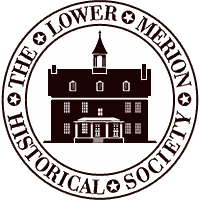The Academy Opens

The Lower Merion Benevolent School, as the Academy was was originally named, opened its doors to students of both sexes on November 1, 1813. Girls were taught reading, writing, arithmetic, English grammar and plain needlework. The boys were taught reading, writing, English grammar, Vulgar and Decimal Arithmetic. Tuition was three dollars per quarter “with a reasonable compensation for firewood and stationery…”
Master Joshua Hoopes informed the parents and students about the “Rules” of the school:
- No student would be admitted if he/she had a contagious disease;
- Vacations occur every other seventh day, or Saturday, and for two weeks at harvest;
- Parents who did not send their children regularly were to pay as if they did;
- No student was to leave the school without the teacher’s permission;
- No use of profane or obscene language was permitted;
- No writing or injury to school property (especially walls or partitions);
- Prizes were to be purchased by parents/guardians of the children to whom they were awarded. Prizes were given each quarter to those “scholars” showing “superior improvement.”
Those rules are very similar to those of modern schools.
The Trustees held quarterly examinations of the students with their parents, guardians, or masters present. Attendance was often poor.
The girls school was closed for a time in 1814 due to declining enrollment. Subscription money to sustain a teacher was therefore lessened. Girls’ tuition was lowered to $2.50 per quarter. The Trustees added to the subscription money to help the shortfall.
A new teacher, Mary Passmore, was hired on a one-year contract for the girls school…subscription money plus $30 per quarter, provided by the Trustees.
…the additional salary as money well expended, hoping that in a future day (not long distant), the credit of the school will be so established as to inable a teacher to be [totally] supported by… subscription money…
The next quarterly examination on February 22, 1815 was better attended. The Trustees hoped more regular attendance by parents would aid them in improving
…the system of managing the schools by pointing out any errors in its present management or such as may happened hereafter…
Another problem for the Trustees seemed to be the “opposition” mentioned in the Minute Book.
For its with much concern the [Trustees] view the uncandid and illiberal Opposition carried on in Order not only to Injure so Benevolent an Institution but to deprive the neighbourhood of the advantages that might arise had less pains been taken to support the Institution that has been taken to oppse it and maligne its conductors…
The opposition might have been neighbors who felt that Jacob’s money should have gone to Quaker projects instead of a project that benefitted the community. The first Trustees would be proud to know the “opposition” did not win, and the Institution continued to serve the community for 184 years and beyond.


